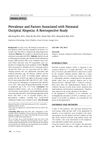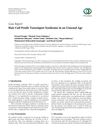 14 citations,
April 2014 in “Medical Clinics of North America”
14 citations,
April 2014 in “Medical Clinics of North America” The document concludes that quick referral and appropriate treatments are crucial for managing common skin conditions and preventing permanent damage.
 37 citations,
March 2005 in “Journal of Paediatrics and Child Health”
37 citations,
March 2005 in “Journal of Paediatrics and Child Health” A hair strand caused a rare case of limb strangulation in a teenage girl with autism, and the condition is not always linked to child abuse.
 3 citations,
November 2010 in “Rheumatic Diseases Clinics of North America”
3 citations,
November 2010 in “Rheumatic Diseases Clinics of North America” Pregnancy can cause symptoms similar to rheumatic diseases, making diagnosis difficult, and affects various body systems, requiring careful distinction between normal changes and serious conditions.
[object Object]  41 citations,
February 1970 in “Archives of Dermatology”
41 citations,
February 1970 in “Archives of Dermatology” Oral contraceptives can cause skin issues like dark patches, acne, yeast infections, sensitivity to light, spider veins, skin rashes, and hair loss.
 14 citations,
January 2015 in “Current problems in dermatology”
14 citations,
January 2015 in “Current problems in dermatology” Female pattern hair loss treatments vary in effectiveness and may have side effects.
 4 citations,
October 2007 in “Dermatologic Clinics”
4 citations,
October 2007 in “Dermatologic Clinics” Glucocorticoids and sex hormones affect skin health, with potential for targeted treatments to minimize side effects and treat skin conditions.
 3 citations,
July 2018 in “JAAPA”
3 citations,
July 2018 in “JAAPA” Some birth control pills can cause hair loss, and switching to ones with less androgen should help.

Early detection and treatment of hair-thread tourniquet syndrome in young girls is important to prevent serious harm.
 1 citations,
February 2022 in “International Journal of Dermatology”
1 citations,
February 2022 in “International Journal of Dermatology” Some skin changes from pregnancy like hair loss, excessive hair growth, palm redness, and stretch marks may not go away after birth and could suggest a misdiagnosis or hidden condition.
 1 citations,
January 2009 in “Journal of Clinical Dermatology”
1 citations,
January 2009 in “Journal of Clinical Dermatology” Hair loss after childbirth is more common in women who have had multiple births, cesarean deliveries, significant weight gain, and full-term pregnancies.
 April 2022 in “Jurnal Ilmiah Kesehatan Media Husada”
April 2022 in “Jurnal Ilmiah Kesehatan Media Husada” Telogen effluvium is a common, reversible hair loss condition treatable with patient education and sometimes Minoxidil.
 October 2005 in “CRC Press eBooks”
October 2005 in “CRC Press eBooks” Telogen effluvium is a condition where hair falls out due to various factors like illness, stress, or nutrient deficiency.
[object Object]  3 citations,
April 1978 in “PubMed”
3 citations,
April 1978 in “PubMed” The study concludes that traction alopecia, caused by hair styling, can help understand telogen effluvium, a condition of excessive hair loss.
 November 2021 in “Dermatology Research and Practice”
November 2021 in “Dermatology Research and Practice” The study aims to understand the skin and hair characteristics of mothers and their babies, and how these may affect newborns' skin health and mothers' postpartum hair loss.
 45 citations,
March 2003 in “Pediatrics”
45 citations,
March 2003 in “Pediatrics” Baby's toe injury linked to mom's hair loss; check baby's toes and be careful with fruit gel snacks.
 35 citations,
December 2014 in “Clinical Obstetrics and Gynecology”
35 citations,
December 2014 in “Clinical Obstetrics and Gynecology” Most skin changes during pregnancy go away after giving birth.
22 citations,
July 2006 in “Annals of The Royal College of Surgeons of England” Hair or fiber wrapped tightly around a toe can lead to serious injury if not treated quickly.
 15 citations,
January 2011 in “Annals of Dermatology”
15 citations,
January 2011 in “Annals of Dermatology” The study concluded that neonatal occipital alopecia is common, not caused by physical friction, and usually resolves on its own without treatment.
 4 citations,
January 2015 in “Case reports in urology”
4 citations,
January 2015 in “Case reports in urology” An 8-year-old boy recovered from a rare case of penile tourniquet syndrome after hair removal surgery.
 2 citations,
May 2017 in “Springer eBooks”
2 citations,
May 2017 in “Springer eBooks” Pregnancy can cause skin changes and affect existing skin conditions, with limited treatment options due to the need for fetal safety.
 1 citations,
December 2015 in “International journal of pediatric research”
1 citations,
December 2015 in “International journal of pediatric research” Hair tourniquets on the clitoris are rare but can cause serious harm and should be removed quickly.
 64 citations,
June 1992 in “International Journal of Dermatology”
64 citations,
June 1992 in “International Journal of Dermatology” Pregnancy often causes skin changes like darkening, stretch marks, and hair growth, which may improve after childbirth.
 February 2012 in “Clinical and Experimental Dermatology”
February 2012 in “Clinical and Experimental Dermatology” Many adult women experience unexplained excessive hair shedding, often starting before age 40.
 47 citations,
May 2002 in “Journal of Cutaneous Medicine and Surgery”
47 citations,
May 2002 in “Journal of Cutaneous Medicine and Surgery” Pregnancy can cause normal skin changes that usually go away after childbirth and don't need treatment.
 41 citations,
October 2017 in “International Journal of Women's Dermatology”
41 citations,
October 2017 in “International Journal of Women's Dermatology” Most pregnant women experience skin darkening and hair changes, with these effects usually going away after giving birth.
 36 citations,
April 1990 in “Dermatologic Clinics”
36 citations,
April 1990 in “Dermatologic Clinics” Most pregnant women experience skin changes like darkening and stretch marks, and some may have skin conditions that usually get better after giving birth.
 November 2013 in “International Journal of Medical and Health Sciences”
November 2013 in “International Journal of Medical and Health Sciences” Doctors often miss Hair Tourniquet Syndrome, which can lead to serious damage if not treated quickly.
 January 2009 in “Springer eBooks”
January 2009 in “Springer eBooks” The document concludes that managing skin conditions during pregnancy is important and requires specialized care.
 32 citations,
July 2021 in “Journal of The American Academy of Dermatology”
32 citations,
July 2021 in “Journal of The American Academy of Dermatology” Hair loss from COVID-19 usually starts around 45 days after infection and lasts about 47.5 days.
 4 citations,
March 2021 in “International Journal of Dermatology”
4 citations,
March 2021 in “International Journal of Dermatology” COVID-19 and related stress may increase hair loss known as Telogen effluvium.





























